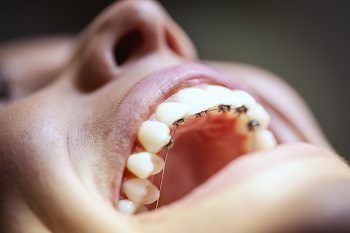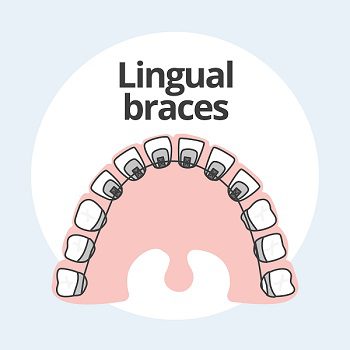Adult Orthodontics: Pros and Cons of Lingual Braces
Dr. Hoss Abar
More than 4 million people in the United States today want to correct their teeth by getting adult orthodontics treatment because they want a healthy, beautiful smile.
Many people, however, are discouraged from obtaining treatment because they dislike the appearance of traditional metal braces. Due to this reason, many practically undetectable choices are available for image-conscious youngsters, working professionals, and those who do not want to draw further attention to their dental work. Their popularity is increasing.
According to research, the global market for invisible adult orthodontics was valued at $2.15 billion in 2017 and is expected to grow to $7.26 billion by 2026.
Lingual braces are an example of undetectable braces. They are similar to conventional braces as they are attached to your teeth, but the only difference is that they are attached behind your teeth.
Who is a good candidate for lingual braces?
Consultation with your orthodontist is the only way to know if lingual braces are correct for you. Lingual braces can fix the same kind of alignment difficulties as traditional braces.
However, lingual braces are not for everyone. For example, patients with deep overbites may have brackets popping off more often.
Your orthodontist will examine your teeth and discuss which treatment choices will work well for you during your initial session. Talk to your orthodontist early if you want to have lingual braces because not all orthodontists are trained to use them.

How much do lingual braces cost?
The cost of braces depends on the following factors:
- The length of your treatment
- Your insurance coverage (if you have insurance)
- The type of appliance you select
However, lingual braces may cost more since putting them on is more delicate and time-consuming than regular braces. Moreover, lingual braces are customizable, which increases the cost. Your orthodontist will discuss pricing and payment plans with you.
Advantages of Lingual Braces
Invisibility: components like brackets, wires, and elastic bands in these braces are all attached to the back of your teeth. Unless you open your lips wide, no one can see them.
Less pain: Studies differ on this point, although lingual braces appear to be the most effective.
In a study of 130 adults wearing various orthodontic appliances, researchers discovered that those who used lingual braces experienced minor pain throughout their first month of treatment.
Other researchers discovered that people who used lingual braces had tongue pain. But those who wore traditional or labial braces had more lip and cheek pain. However, there were no significant differences in pain ratings among 60 labial and lingual braces users, and the pain decreased over time.
Another research of 68 people discovered that those who used lingual braces had more severe discomfort, and the recovery was longer than those who used labial braces and clear aligners. After two weeks, many people who wore lingual braces still had eating problems.
Any braces will cause some discomfort in your mouth initially. The biggest complaint of those who use braces is pain and discomfort.
Your soreness, though, will pass. Meanwhile, your orthodontist may advise you to use orthodontic wax, over-the-counter pain relievers, and eat cold foods.

Fewer lifestyle modifications: Wearing braces of any kind will cause some adjustments at first. You may need to start with soft foods and learn how to clean your braces, among other things. However, lingual braces may require fewer lifestyle modifications than traditional braces.
For example, if you wear conventional braces and play the flute or saxophone, you may need to change your technique and clean your instrument more frequently. Wearers of traditional braces often take longer to resume playing the trumpet or French horn.
As lingual braces are cemented behind your teeth, you do not need to adjust your mouth or lip positions when playing woodwind or brass instruments.
If you have lingual braces, you may be able to kiss more easily. There are no brackets to deal with on the front of the teeth. If you experience issues, using orthodontic wax on the bumpier areas of your brackets can help.
Customizable: Orthodontists can use computer-aided design and manufacturing (CAD/CAM) technologies to customize lingual braces.
Experts investigated 42 lingual brace users and discovered that individuals who used personalized lingual brackets had fewer speaking and chewing problems than those who wore manufactured brackets. Those who used prefabricated brackets also experienced higher tongue pain and pressure ulcers.
Disadvantages of Lingual Braces
Speech effects: When you talk, your tongue makes particular sounds by touching the backs of your teeth. When you first get lingual braces, it will cause speech impairment since the brackets are on the back surfaces of your teeth.
While all braces might temporarily disrupt your speech patterns, the 2014 National Institute of Health's research discovered that lingual braces could cause your speech to sound different for a month or more. According to the study, the degree of speech impairment may vary depending on the brand of brackets used by your orthodontist.
Speech therapy procedures have helped some people correct their lingual lisp. Your tongue will adjust to the braces after some time, and your speech will recover.
Cleaning issues: Maintaining good dental hygiene may be more difficult with lingual braces. Food particles can get stuck between the brackets of your lingual braces. However, a water flosser can help you in removing any trapped food.
Conclusion
If you need braces but don't want them visible, lingual braces can be a good choice. They are less apparent than traditional braces because of their placement behind your teeth.
Depending on local pricing and specific dental needs, lingual braces may cost more than traditional braces. Moreover, you might expect discomfort while your tongue adjusts to the brackets and a slight lisp in the initial weeks or months of treatment. Your treatment duration can also be slightly longer.
Therefore, meeting with an orthodontist is the best method to decide whether orthodontic braces, like lingual braces, are a good option for you. Furthermore, they can examine your teeth and recommend the best line.
Contact your Pinole dentist, Dr. Hoss Abar, DDS, MSD at Abar Orthodontics, to learn about Adult Orthodontics and Lingual Braces.
Resource:
Adult Orthodontics: What Are My Treatment Options?
This media/content or any other on this website does not prescribe, recommend, or prevent any treatment or procedure. Therefore, we highly recommend that you get the advice of a qualified dentist or other medical practitioners regarding your specific dental condition.
More To Explore
About Us
We believe that every patient deserves to feel confident about their smile. Years of experience creating beautiful and flawless smiles.
Opening Hours:
Monday - Thursday: 8:00 AM - 5:00 PM
Friday: 8:00 AM - 12:00 PM
Saturday - Sunday: Closed
Abar Orthodontics, Pinole, CA
1500 Tara Hills Drive., Suite 204
Pinole, CA 94564
Abar Orthodontics, San Leandro, CA
145 East 14th street., #100
San Leandro, CA 94577
© 2026Abar Orthodontics | All rights reserved | Powered by:Vigorant, Inc.
